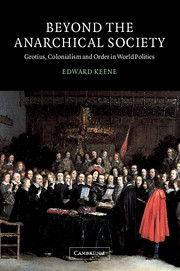Book contents
- Frontmatter
- Contents
- Preface
- Acknowledgements
- Introduction
- 1 The orthodox theory of order in world politics
- 2 The Grotian theory of the law of nations
- 3 Colonialism, imperialism and extra-European international politics
- 4 Two patterns of order in modern world politics: toleration and civilization
- 5 Order in contemporary world politics, global but divided
- Conclusion
- Bibliography
- Index
4 - Two patterns of order in modern world politics: toleration and civilization
Published online by Cambridge University Press: 22 September 2009
- Frontmatter
- Contents
- Preface
- Acknowledgements
- Introduction
- 1 The orthodox theory of order in world politics
- 2 The Grotian theory of the law of nations
- 3 Colonialism, imperialism and extra-European international politics
- 4 Two patterns of order in modern world politics: toleration and civilization
- 5 Order in contemporary world politics, global but divided
- Conclusion
- Bibliography
- Index
Summary
I have contested the orthodox view that order in modern world politics rests on the conjunction between the Grotian legal concept of international society and the historical concept of a states-system. In the first place, it is misleading to interpret Hugo Grotius's work as an anticipation of what legal order might look like in the emerging society of territorially sovereign states, since two of its central themes reflected the quite different propositions that sovereignty is divisible and that individuals as well as sovereigns have rights in the law of nations. I have also tried to fill in one of the crucial gaps that arises from orthodox theorists' decision to concentrate on the development of European public order in virtual isolation from the rest of the world. At the same time that the ‘Westphalian system’ of equal and mutually independent territorially sovereign states was taking shape, quite different colonial and imperial systems were being established beyond Europe, predicated above all on the division of sovereign prerogatives across territorial boundaries and the assertion of the rights of individuals, especially to property. We therefore ought to reject the view of Hedley Bull, to take just one recent example, that ‘[t]he idea of international society which Grotius propounded was given concrete expression in the Peace of Westphalia’. It is the colonial and imperial systems beyond Europe that have the closest affinity with Grotian ideas about the law of nations and, if we are to talk about a ‘Grotian conception of international society’ at all, we should rather be concerned with the distinctly non-Westphalian structure of political and legal order in the extra-European world.
- Type
- Chapter
- Information
- Beyond the Anarchical SocietyGrotius, Colonialism and Order in World Politics, pp. 97 - 119Publisher: Cambridge University PressPrint publication year: 2002



